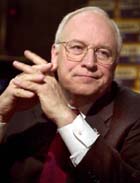Cheney plans trip to advance 'freedom agenda'
Vice President Dick Cheney looked ahead Tuesday to a three-nation, six-day trip designed to nurture democracy and advance U.S. interests in lands where political change does not always come easily.

Administration officials said a speech in Lithuania on Thursday to leaders of the Baltic and Black Sea regions would be the centerpiece of the journey, which also includes an unusual high-level visit to Kazakhstan.
The final stop was Croatia, where Cheney arranged meetings with leaders of three members of the Adriatic Charter, an organization founded by countries sager for admission to NATO, Besides Croatia, the group includes Albania and Macedonia.
While officials hoped Cheney's trip would advance President George W. Bush's second-term "freedom agenda," energy issues, Iran's nuclear program and concerns about Russian President Vladimir Putin's actions also hovered over the journey.
The Soviet Union once occupied many of the countries whose leaders Cheney intends to meet, and President George W. Bush recently expressed concern about the pace of democratization in Russia.
There were other complicating factors, none more so than in Kazakhstan.
President Nursultan Nazarbayev, who has ruled the ex-Soviet republic for 16 years, has come under criticism recently for becoming increasingly authoritarian.
At the same time, he sent troops to support the U.S.-led invasion of Iraq, and the Pentagon lists one member of the detachment as among the war dead.
Additionally, Kazakhstan has a strategic location, sharing borders with both China and Russia. It also holds vast energy resources at a time of increasing global demand for oil and gas supplies.
In that vein, Nazarbayev is the third foreign leader to receive personal attention from the Bush administration in recent weeks despite persistent concerns about a willingness to tolerate freedom.
Bush met recently with the President of Azerbaijan, Ilham Aliev, at the White House.
And Secretary of state Condoleezza Rice greeted Equatorial Guinean President Teodoro Obiang Nguema as "a good friend." He seized power in a 1979 coup and his government has been regularly accused by the State Department of human rights violations, including torture and deaths of prisoners.
Administration officials have defended the meetings, saying that Bush and other officials make a point of raising human rights and other social policy concerns, reports AP.
O.Ch.
Subscribe to Pravda.Ru Telegram channel, Facebook, RSS!





